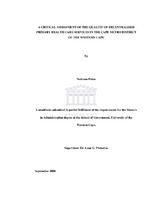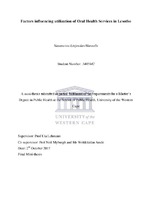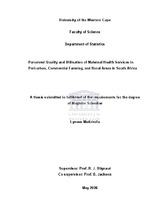A critical assessment of the quality of decentralised primary health care services in the cape metro district of the Western Cape
Abstract
The complex and multi-facet decentralisation process of Primary Health Care services in the Cape Metro District of the Western Cape will be critically assessed in this thesis. Primary Health Care is the provision of promotive; preventative; curative and rehabilitative services within the community setting. South Africa initially adopted the Primary Health Care strategy in 1978 as a member state of the World Health Organisation but this was during the Apartheid regime which did very little about implementing the strategy. In 1994 the Government of National Unity (GNU) came into power and there was a renewed commitment to implementing Primary Health Care in order to render health care services to the previously underprivileged
masses. The GNU set an eight year time frame for the full implementation of this process from the date of commitment. Now more than ten years later an assessment of the process is necessary to determine if the objectives of the process has been
achieved. An independent organisation such as the Health System Trust has in 1998 and 2003 provided some form of evaluation of the process and this will also be discussed in thesis.
The District Health system is part of a unitary Provincial Health System that is decentralised to enable the centre (Provincial Management) and the periphery (District and Sub-district Management) to function more effectively and cooperatively. The District Health System is the management structure for primary health care services as this system allows for interaction of all the role-players involved in delivering health care at district level as it puts in place a decentralised Health Management team who is responsible for the planning, managing,
implementing and monitoring of the Primary Health Care Package of care at district level. In summary the district is the place where community needs and national priorities are reconciled. This thesis will therefore show the disjuncture that exists between the Primary Health Care policy intent, the policy implementation and the service delivery outcomes on the ground level. The general objective is to do a critical assessment of the Quality of Decentralised Primary Health Care Services in the Cape Metro District of the Western Cape. More specific objectives for the research include: Defining and discussing the Primary Health Care Approach and the District Health System using the target indicators currently used by the City of Cape Town and the Provincial government of the Western Cape Health department to assess the impact of this process. To document
the implementation process of the District Health System in the Cape Town Metro District as a case study while analysing the findings in terms of successes, constraints, challenges; and make recommendations for the way forward. The methodology of the study is of a qualitative and descriptive nature. The research
design is a case study of the Cape Metro District. The target population will be all those accessing primary health care services in this district. The sample technique is selected by convenience. Data will be gathered directly and indirectly by doing observation and semi – structured interviews and the administration of questionnaires. The framework criteria for assessing the quality would for example include key indicators such as for example the ratio of Professional Nurse to patient;
number of health services per three kilometre radius as per the Comprehensive Service Plan 2007 goals and the availability of essential drugs as per primary health care protocol. This directly relates to the key elements that underpin the District Health System namely: equity, access, quality, effectiveness, efficiency,
sustainability, overcoming fragmentation, intersectoral approach and community participation. The main findings indicate that not enough resources have been allocated to the
decentralising process causing much delay in its implementation. Shortages of health professionals, infrastructure constraints and poor adherence to legislation also contribute to the delay in implementation. This is why to date the four health districts
of the Cape Town Metro District is not fully functional and the quality of the service they provide do not fully adhere to the 2010 Health Care Plan Model.
Collections
Related items
Showing items related by title, author, creator and subject.
-
Factors influencing utilization of oral health services in Lesotho
Linjewile-Marealle, Navoneiwa (University of the Western Cape, 2017)The oral health programme in Lesotho aims to offer curative, preventive, promotive and rehabilitative oral health services. However, observations as well as annual reports suggest that oral health service utilization is ... -
Perceived quality and utilisation of maternal health services in peri-urban, commercial farming, and rural areas in South Africa
Matizirofa, Lyness (University of the Western Cape, 2006)This investigation aimed to determine factors that influence women's utilisation of maternal health services, with specific focus on the quality of care and services available to disadvantaged communities in South Africa. ... -
A participatory approach to the design of a child-health community-based information system for the care of vulnerable children
Byrne, Elaine (University of the Western Cape, 2004)The existing District Health Information System in South Africa can be described as a facility based Information System, focusing on the clinics and hospitals and not on the community. Consequently, only those who access ...




